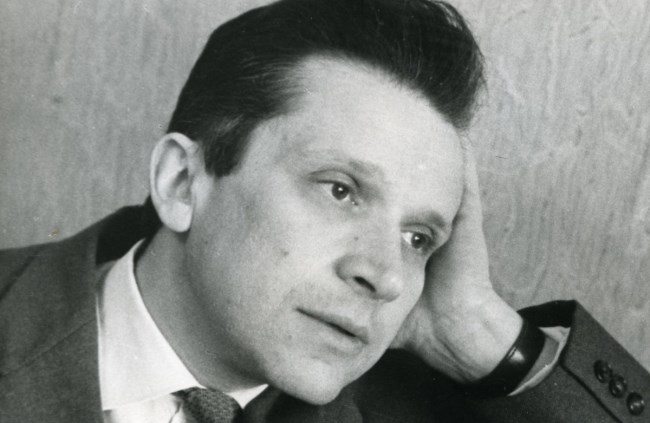Veniamin Fleishman, Rothschild’s Violin
By Peter Laki
Born July 20, 1913, in Bezhetsk, Russia
Died September 14, 1941, in Krasnoye Selo, near Leningrad
Composed by Fleishman in 1939–41, completed by Shostakovich in 1944
Premiered on June 20, 1960, in Moscow
Performance Time: Approximately 40 minutes
Shostakovich called Veniamin Fleishman his favorite student at the Leningrad Conservatory. At his teacher’s suggestion, Fleishman was working on a one-act opera based on Chekhov’s short story “Rothschild’s Violin” (he himself had written the libretto) when, following the Nazi invasion of Russia, he enlisted in the Red Army. A few weeks later, he was killed.
Shostakovich took it upon himself to complete his student’s unfinished project. Evacuated from Leningrad to Kuibyshev, he went to considerable trouble to obtain Fleishman’s manuscript and finished the composition and orchestration in 1944. However, because of its Jewish subject matter, the opera could not be performed for many more years. The music was played in concert in Moscow in 1960, but the staged premiere had to wait until 1968, when it was produced by the Experimental Studio of Chamber Opera under the artistic direction of Solomon Volkov. Volkov later recalled that after a single night, a Party official, apparently unfamiliar with Chekhov, forbade further performances because he thought that the violin in the title belonged to a member of the Rothschild banking family who were considered evil Zionist conspirators and supporters of the state of Israel.
In reality, the fiddle in question is owned by a dirt-poor Jewish musician in a small provincial town in Russia, who inherits it at the end of the story from an equally penniless Christian coffin-maker named Yakov Ivanov (who, as it happens, plays in the town’s Jewish orchestra). Chekhov’s story shows how dire poverty almost kills all human feeling in Yakov, who only undergoes a spiritual transformation when at death’s door. Yakov’s life philosophy may be summed up in the most memorable line in the short story and the opera: “Life is all loss, only death is gain.” Having quarreled endlessly with Rothschild the flute player, Yakov ends up bequeathing his fiddle, his only prized possession, to the young Jew, who will play on it melodies so plaintive and sad that everyone who hears him weeps, and he himself at last raises his eyes and murmurs: “Okh-okh!” This new song has so delighted the town that the merchants and government officials vie with each other in getting Rothschild to come to their houses, and sometimes make him play it ten times in succession.
Fleishman showed an excellent theatrical sense in dramatizing Chekhov’s narrative. He cut all secondary characters and retained only the four essential ones: Yakov; Rothschild; Shahkes, the leader of the Jewish band; and Yakov’s wife, Marfa. Right at the beginning of the opera, he created a lively ensemble with the band rehearsing, Yakov chastising Rothschild for playing a merry tune sadly, Rothschild screaming back, and bandleader Shahkes vainly trying to keep peace. As Yakov storms out, we follow him back to the porch of his house, where he sings his first monologue about all the losses in his life.
Marfa appears and, without any introduction, says to her husband: “Yakov, I’m dying.” As soon as she has made this tragic announcement, the Jewish band next door strikes up a merry klezmer tune. Then the band leaves and Rothschild, staying behind by himself, plays a sad tune on his flute.
Throughout the opera, Fleishman superimposes simultaneous events on one another, as when Marfa reminisces about the child she and Yakov lost 50 years ago, while Yakov, who doesn’t even seem to remember, is thinking of losses of a very different kind (monetary ones). Meanwhile, the klezmer band resumes its practice. Dissatisfied with his musicians, Shahkes sends Rothschild to Yakov’s house to request (or, rather, to demand) that the coffin-maker come right away to help out the group. But when Rothschild appears, interrupting Yakov’s meditations about how he mistreated his wife for 50 years, he receives an extremely unfriendly welcome and leaves in a hurry. The ensuing, animated orchestral interlude shows him pursued by nasty street urchins shouting “Jew! Jew!” as they pursue him with their dogs.
Yakov’s transformation takes place in his third and final solo scene. Revisiting the willow-tree by the river where he sat with Marfa when they were young, he suddenly remembers everything and, in the culminating scene of the opera, discovers where his life went wrong. When Rothschild reappears, begging him to come play in the orchestra that can’t do without him, Yakov gifts him his fiddle, and Rothschild immediately begins to play his sad tune on it. The powerful orchestral postlude drives home the transcendent significance of Yakov’s act.
Peter Laki is Visiting Associate Professor of Music at the Bard College Conservatory of Music.

